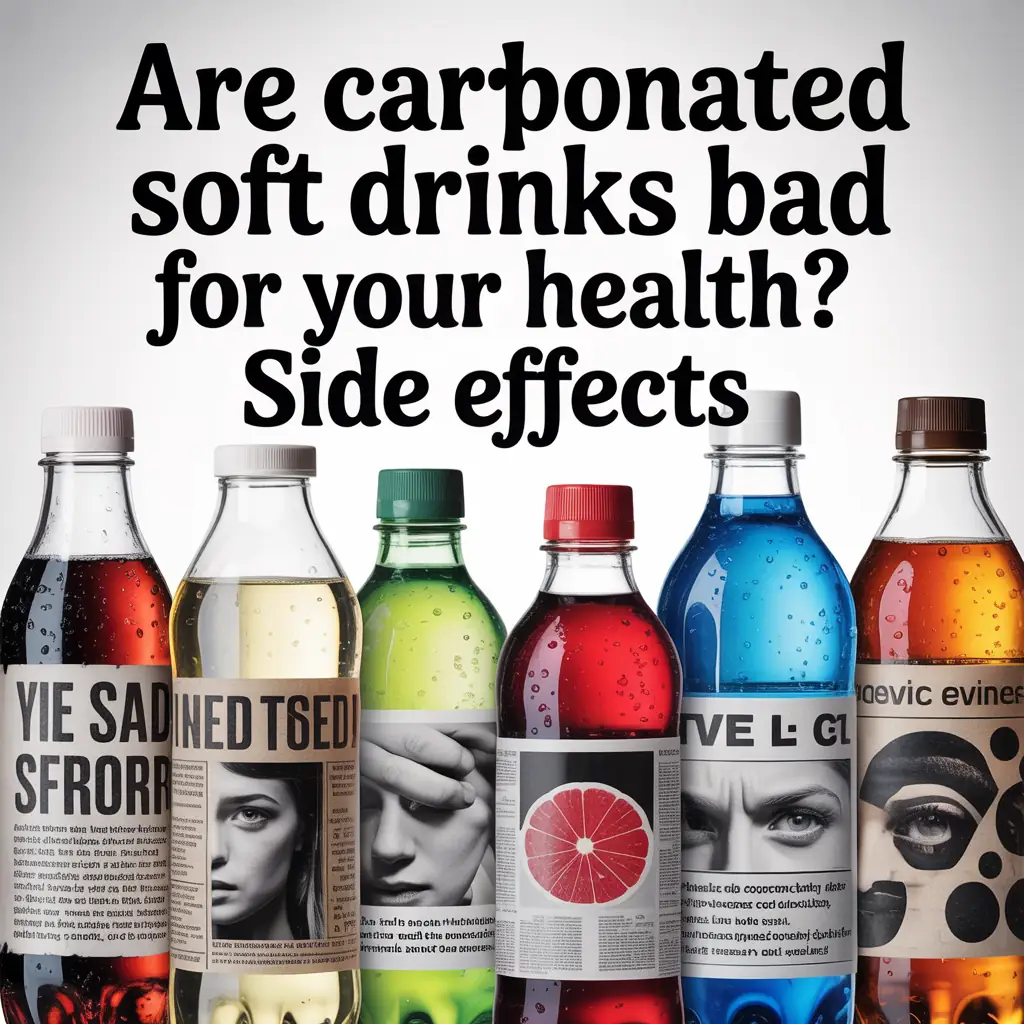Carbonated soft drinks are very popular around the world. They are known for their fizzy feel and unique taste. These drinks have carbon dioxide in them, and they can be anything from cola to tonic water and sugary sodas.
They can be a fun choice instead of regular water, but how healthy are they? These drinks often contain artificial sweeteners and carbonic acid. This can lead to health issues. Let’s look at the hidden health risks that may come with your favorite carbonated drinks.
Key Takeaways
- Carbonated soft drinks, filled with sugary content and additives, are linked to major health risks like obesity and type 2 diabetes.
- The acidic nature of these beverages can cause tooth enamel erosion, resulting in dental health issues like cavities.
- Frequent consumption negatively impacts bone health, leading to calcium depletion and increased fragility.
- Carbonation can lead to digestive problems such as bloating and acid reflux, exacerbating existing conditions.
- The combination of sugar and caffeine in these beverages adds addictive properties, pushing excessive intake.
- Understanding the contents and side effects of carbonated drinks is crucial for making healthier choices.
Also Read: When Can I Eat Spicy Food After Wisdom Teeth Removal?
Are Carbonated Soft Drinks Bad for Your Health?

Carbonated soft drinks might seem harmless, but they can actually harm your health. These drinks have added sugars and artificial ingredients. They can lead to problems like weight gain and tooth issues. Drinking them often can lead to serious health problems, including type 2 diabetes and heart disease. They can also become addictive, making it hard to cut back on how much you drink.
Even though they have tempting flavors, soft drinks have chemicals like phosphoric acid and citric acid. These can throw your body’s balance off over time.
Some people think diet sodas are a better choice, but these may have their own risks from artificial sweeteners. Instead, switching to plain water or unsweetened sparkling water is a healthier choice. Keep reading to learn how these beverages affect the body.
What’s Inside a Carbonated Soft Drinks?
Understanding what is in a carbonated drink is important to know its health effects. The fizz comes from carbon dioxide gas, which creates carbonic acid. This gives the drink a tangy taste but makes it a bit acidic. Over time, this can damage tooth enamel.
Apart from the fizz, many drinks include sugary drinks that can lead to addiction and a lot of extra calories. Ingredients like artificial sweeteners, phosphoric acid, and citric acid make the flavor stronger, but they also carry health risks. Different drinks, like cola and root beer, have varying ingredients, but they all affect dental health and overall health in similar ways. Next, learn about the main side effects of carbonated drinks and how they can affect your body.
Major Side Effects of Drinking Carbonated Soft Drinks
Drinking fizzy beverages often can cause several health problems. One big issue is dental erosion. This is mainly because of the weak acids in soft drinks, which can wear away tooth enamel over time. People who drink these sugary drinks may also experience digestive problems, like bloating and gastroesophageal reflux disease (GERD). The carbonation can make feelings like an upset stomach worse. Knowing about these side effects is important for our health.
Also Read: Bump on Roof of Mouth: Causes & When to See a Doctor
⚠️ 1. Weight Gain & Obesity
One big effect of carbonated soft drinks is their role in weight gain and obesity. These drinks are full of sugary drinks that have little nutrition. They also lead to taking in too many calories. Drinking them often can cause fat build-up and make you more likely to get obesity-related illnesses, like fatty liver disease.
The sugars in these drinks can trigger dopamine. This feeling can create a habit, making it hard to cut back on how much you drink. Over time, this raises your need for sweet drinks and increases the long-term health effects of obesity.
A simple way to fight this issue is by swapping sugary drinks for plain water or unsweetened sparkling water. Changing your habits can really help your overall health. Next, we’ll look at another common health risk from carbonated soft beverages.
⚠️ 2. Type 2 Diabetes Risk
Carbonated drinks, especially sugary drinks, are closely tied to more cases of type 2 diabetes. These beverages have a lot of sugar which raises blood sugar levels and puts extra strain on your pancreas, the part of your body that makes insulin. Over time, this pressure can lead to insulin resistance, which directly causes diabetes.
Sugary drinks can be addictive, making it hard to limit how much you drink. As you drink more, your chance of getting harmful health effects linked to diabetes rises, like nerve damage and heart problems.
Choosing options like mineral water or plain water without added sugars can help manage blood sugar levels better. Then, find out how carbonation can harm your teeth.
⚠️ 3. Tooth Decay and Cavities
The acid in carbonated drinks can seriously harm your dental health and cause tooth decay and cavities. Ingredients such as carbonic acid and citric acid wear away tooth enamel. This makes your teeth more exposed to bacteria and decay. Also, the high sugar in these drinks makes the issue worse. It encourages bacteria to grow, which can lead to dental erosion.
Drinking these beverages often can lead to long-term damage to your teeth. Family dentists often advise against drinking too many sugary drinks, especially for kids whose teeth may be more fragile.
You can lower these risks by choosing drinks with less acid or by rinsing your mouth with plain water after you drink. Next, we will look at how carbonation impacts your bone health.
⚠️ 4. Bone Weakness (Calcium Depletion)
Drinking too many carbonated soft drinks can harm your bones because they can take away calcium. The phosphoric acid in these drinks can make it harder for your body to absorb calcium. This can lead to problems like osteoporosis and broken bones. Also, too much carbon dioxide from these fizzy drinks can change the body’s pH balance, hurting bone health even more.
If you want a healthy way to stay hydrated, think about choosing plain water or seltzer. These options give you a nice fizzy feel without risking your important nutrients.
⚠️ 5. Heart Health Concerns
The sugar in these drinks is connected to heart disease. Drinking them often can harm your heart. Sugars raise the levels of LDL, which is bad cholesterol. They lower HDL, the good cholesterol. This can create plaque in the arteries. Over time, this can cause serious health issues like high blood pressure, stroke, or a heart attack.
Also, the phosphoric acid in these drinks can cause problems in the body that may hurt the heart. When you add high levels of caffeine, it increases the chance of heart disease even more over time.
Switching to water and cutting back on these drinks can really help your heart health. Next, we will talk about how fizzy drinks can affect your digestion.
⚠️ 6. Digestive Issues (Bloating, Acid Reflux)
Drinking a lot of carbonated soft drinks can cause problems with digestion. Many people report feeling bloated or having acid reflux. The carbonation, which mainly comes from carbon dioxide gas, puts pressure on the stomach. This can lead to discomfort and more gas.
Plus, acidic ingredients like citric acid and phosphoric acid can weaken the esophageal sphincter. This raises the chance of developing gastroesophageal reflux disease (GERD). Choosing drinks like mineral water or seltzer water can keep you hydrated without these digestive issues.
⚠️ 7. Addictive Properties of Sugar & Caffeine
Sugar and caffeine in carbonated soft drinks make them very addictive. Sugars cause the release of dopamine, which creates a good feeling of pleasure and makes people want more. Caffeine is a stimulant that keeps you alert, which also encourages regular use.
This mix leads to strong cravings that can cause people to drink too much. Unfortunately, these habits can lead to long-term health effects like obesity and trouble sleeping. People who are addicted to sugary drinks often find it hard to switch to healthier choices because these habits are so strong.
To reduce this problem, it helps to cut back on sweet drinks or choose flavored water without sugar or caffeine. You can find out surprising facts about soda in the next section.
Conclusion
In conclusion, carbonated soft drinks can be refreshing. However, drinking them can cause many health issues that you should not ignore. These issues include weight gain, a higher risk of type 2 diabetes, and problems with dental health and bone strength. It’s important to pay attention to what is in these drinks.
Considering healthier choices is a good idea for quenching your thirst. By being smart about your drink options, you can help protect your health. If you want to change your drinking habits, talk to health professionals. They can guide you on the best way to move forward.
Frequently Asked Questions
1. Are all carbonated drinks harmful to health?
Not all carbonated drinks are bad for your health. Drinks like mineral water or fizzy water without added sugars are better choices than soft drinks. Sugary fizzy drinks can harm your body, but regular water and plain sparkling options are not as harmful.
2. Can carbonated drinks cause dental issues?
Yes, sugary drinks with carbonic acid can wear away tooth enamel. This can cause dental erosion and lead to cavities. While sparkling water is not as harmful, drinking too much sugary carbonated drinks can damage dental health. Rinsing your mouth with plain water afterward can help reduce damage to your teeth.
3. Is sparkling water bad for your health?
Sparkling water is usually safe to drink, especially when it has no added sugars. It’s a healthy choice compared to soda. Sparkling water is just mineral water mixed with carbon dioxide bubbles. Unless it has artificial sweeteners, it hydrates you well without hurting your health.
4. Can soda cause cancer?
There is no clear proof that soda causes cancer. However, some additives, like synthetic chemicals in sugary drinks, could increase the risk. Being exposed to certain preservatives for a long time raises concerns about cancer-related health effects. Still, the evidence is not strong.
5. What is considered a carbonated soft drink?
A carbonated soft drink is a type of drink that includes soda, tonic water, seltzer water, and club soda. These beverages are made with carbon dioxide gas. The bubbles in these drinks come from this gas. They usually contain artificial flavors, other ingredients, and sugars. This is what makes them taste unique and refreshing.
6. What are the negatives of carbonated drinks?
Carbonated drinks can have many health effects. They may lead to tooth decay, obesity, and weaker bone health. These sugary drinks have high sugar content and carbonation, which can cause digestive problems. In some cases, they may also affect heart health. Over time, this can raise health risks.
7. Is it bad to drink carbonated drinks everyday?
Drinking carbonated drinks every day can hurt your body. It can lead to more digestive issues, high sugary content, and problems with absorbing nutrients. On the other hand, if you cut back on these fizzy drinks, you can lower your health risks a lot.
8. What happens if you drink too much carbonation?
Drinking too many beverages with excess carbon dioxide can lead to bloating and digestion problems. This can make issues in sensitive stomachs worse and may contribute to long-term health effects, such as GERD. To prevent discomfort, it is best to limit your intake of carbonated drinks.
9. What are 4 possible negative side effects of carbonated water?
Carbonated water can cause some digestive issues and weaken tooth enamel. It might also lead to potential bone weakness and health risks because of its sugary content. By picking options without additives or acids, you can reduce these problems a lot.
10. Which soft drink is the least harmful?
The soft drink options that are the least harmful use sugar alternatives or artificial sweeteners that have fewer calories. Diet soda could be better compared to regular soda. However, there can still be health effects from non-sugar drinks.



